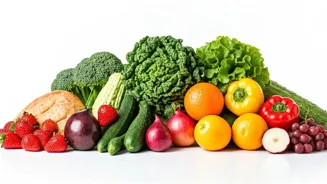Myth 1: Detox Diets
One of the most pervasive myths is the effectiveness of detox diets. These diets are often marketed as a quick fix to cleanse the body and shed weight.
However, health experts widely debunk these claims, stating that the body has its own natural detoxification system, primarily through the liver and kidneys. There's no scientific evidence to suggest that specific diets can accelerate this process. Moreover, many detox diets involve extreme calorie restriction or the elimination of essential nutrients, which can lead to deficiencies and potentially harm health. Focusing on a balanced diet rich in fruits, vegetables, and whole grains is a more effective and sustainable approach to overall well-being. The human body is well-equipped to detoxify itself without the need for special or expensive diets.
Myth 2: Carbs are Evil
For many, the mere mention of carbohydrates conjures images of weight gain. However, the reality is far more nuanced. Carbs are not inherently bad; they are a primary source of energy for the body. The type of carbohydrate is the key. Simple carbohydrates, found in processed foods and sugary drinks, can lead to rapid blood sugar spikes, contributing to weight gain. Complex carbohydrates, like those found in whole grains, fruits, and vegetables, are digested more slowly, providing sustained energy and essential nutrients. These complex carbs also contain fiber, which supports digestive health and helps regulate blood sugar levels. The demonization of all carbohydrates ignores their essential role in a balanced diet and the health benefits of choosing the right types of carbs.
Myth 3: Low-Fat Diet
The low-fat diet craze, which dominated the health landscape for years, is another misconception that has been widely debunked. While reducing saturated and trans fats is crucial for heart health, completely eliminating fats from your diet is not beneficial. Fats are essential for various bodily functions, including hormone production, nutrient absorption, and brain health. Healthy fats, such as those found in avocados, nuts, seeds, and olive oil, are beneficial and can contribute to overall well-being. These fats provide energy and support cell growth. The emphasis should be on choosing healthy fats rather than drastically cutting them out entirely.
Myth 4: All Calories Equal
A fundamental misunderstanding centers around the concept that all calories are created equal. While a calorie is a unit of energy, the source of those calories has a significant impact on the body. For instance, 100 calories from a sugary soda provide little to no nutritional value, while 100 calories from an avocado offer healthy fats and essential nutrients. The nutritional value of foods, including vitamins, minerals, and fiber, determines how the body processes and utilizes those calories. Focus on the quality of food rather than simply counting calories. Consider the nutrients that each food provides to make informed choices and to support your overall health.
Myth 5: Breakfast is Crucial
The long-held belief that breakfast is the most important meal of the day has been challenged in recent years. While breakfast can be beneficial, its importance is often overstated. Skipping breakfast does not automatically lead to weight gain or other health problems. The key is to listen to your body and eat when you're hungry. For some people, eating breakfast can help regulate blood sugar levels and prevent overeating later in the day. For others, skipping breakfast and eating later can be perfectly fine. The best approach is to choose what works best for your body and lifestyle, considering your hunger levels and eating patterns. It's less about eating breakfast and more about ensuring you receive sufficient nutrients throughout the day.
Myth 6: Diet Soda Safe
Diet soda, often marketed as a healthier alternative to regular soda, is another source of confusion. While it may contain fewer calories, diet soda is not necessarily a health panacea. It often includes artificial sweeteners, which can trick the body into craving more sweets. Studies have also shown that these artificial sweeteners may alter the gut microbiome, potentially affecting metabolism. Furthermore, diet soda does not provide any nutritional value. The focus should be on consuming water and beverages that provide nutrients rather than empty calories. Over-reliance on diet soda can potentially lead to health issues over time.
Myth 7: Gluten-Free Ideal
The popularity of gluten-free diets has skyrocketed in recent years, but for many, it is an unnecessary dietary restriction. Gluten is a protein found in wheat, barley, and rye. Only individuals with celiac disease or gluten sensitivity need to avoid gluten for health reasons. For those without these conditions, gluten is generally harmless and can be a part of a balanced diet. Gluten-free products are sometimes lower in fiber and can contain more sugar and additives than their gluten-containing counterparts. Unless you have a diagnosed medical condition, focusing on a balanced diet rather than eliminating gluten is the better approach.
Myth 8: Exercise is Enough
Many people believe that exercise alone is sufficient for weight loss and overall health. While physical activity is vital, it is only half the battle. Nutrition plays a crucial role. The body's response to exercise is significantly influenced by what you eat. Without a balanced diet, exercise might not yield the expected results. Combining regular physical activity with a healthy diet is crucial for achieving optimal health outcomes. Prioritizing nutrient-rich foods to fuel your workouts and support recovery can maximize the benefits of exercise.
Myth 9: Superfoods Are Magic
The term 'superfood' is often used to describe certain foods with exceptional nutritional value. While these foods, such as blueberries or kale, are incredibly healthy, the idea that they are magical or can single-handedly improve your health is a misconception. No single food can provide all the necessary nutrients for a balanced diet. Focusing on a variety of whole, unprocessed foods is more crucial than relying on a few 'superfoods.' Include a diverse range of fruits, vegetables, and other nutrient-rich foods to optimize your health. Balance is the key to overall well-being.
Myth 10: Supplements Are Essential
Supplements are often seen as a quick fix to bridge nutritional gaps. However, supplements are not always essential, and they should not replace a balanced diet. While some individuals may need supplements to address specific deficiencies, most people can obtain the necessary nutrients through a well-rounded diet. Taking excessive supplements can sometimes be harmful, leading to nutrient imbalances. It's always best to consult with a healthcare professional before starting any new supplements. A food-first approach, focusing on a balanced diet with diverse nutrients, should be the primary focus.

















